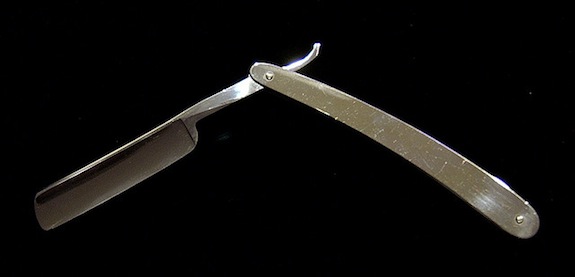Ockham Never Really Had a Razor
Ockham never really said anything about razors; he was more interested in Scripture

Image: druzziel
Every college philosophy major knows about Ockham’s razor—the dictum that if you’ve got two hypotheses you should go with the one that makes the fewest number of assumptions. A common short-cut to understanding this idea: “If you hear hoofbeats, you should assume horses, not zebras.” But is that what William of Ockham really meant? No, not at all. says Jacques Vallee at Boing Boing.
Here’s what Ockham really said (from the Stanford Encyclopedia of Philosophy):
“Nothing ought to be posited without a reason given, unless it is self-evident or known by experience or proved by the authority of Sacred Scripture.”
Vallee, at Boing Boing, walks us through this logic, applied to the planets. Let’s say we have two hypotheses. One is the current state of science: the planets revolve around the sun. The second is an alternate idea: planets are moved through space by angels. So, what would Okham say?
Were we to apply Ockham’s formulation of the razor literally, the choice between these two hypotheses is clear. It does not favor the first hypothesis, the standard scientific interpretation. The Scriptures clearly state that angels do exist, and their reality was re-affirmed by Pope John Paul II as recently as August 1986. Since they manifest through their actions in the heavens, the second hypothesis appears far more parsimonious and elegant than the complicated rationalizations used by mathematicians and astronomers, which involve unseen entities such as the acceleration of gravity, centrifugal force, and mass, which – to this day – raise issues that science is yet to resolve. If you seriously believe in angels, then the contemporary consensus about planetary motion is a case of “plurality without necessity.”
The second hypothesis is also more powerful since angels can just as easily move the planets around the earth as around the sun. They can do whatever they like—and thereby explain any phenomena.
Now, Vallee isn’t arguing that we shouldn’t go with the theory that makes the fewest assumptions. But that’s not really what Ockham himself was trying to say, it seems.
More from Smithsonian.com:
Alan Turing’s 60-Year-Old Prediction About Patterns in Nature Proven True
Key to Getting Holiday Shopping Right, Science Says, Is to Trust Your Gut
/https://tf-cmsv2-smithsonianmag-media.s3.amazonaws.com/accounts/headshot/Rose-Eveleth-240.jpg)
/https://tf-cmsv2-smithsonianmag-media.s3.amazonaws.com/accounts/headshot/Rose-Eveleth-240.jpg)